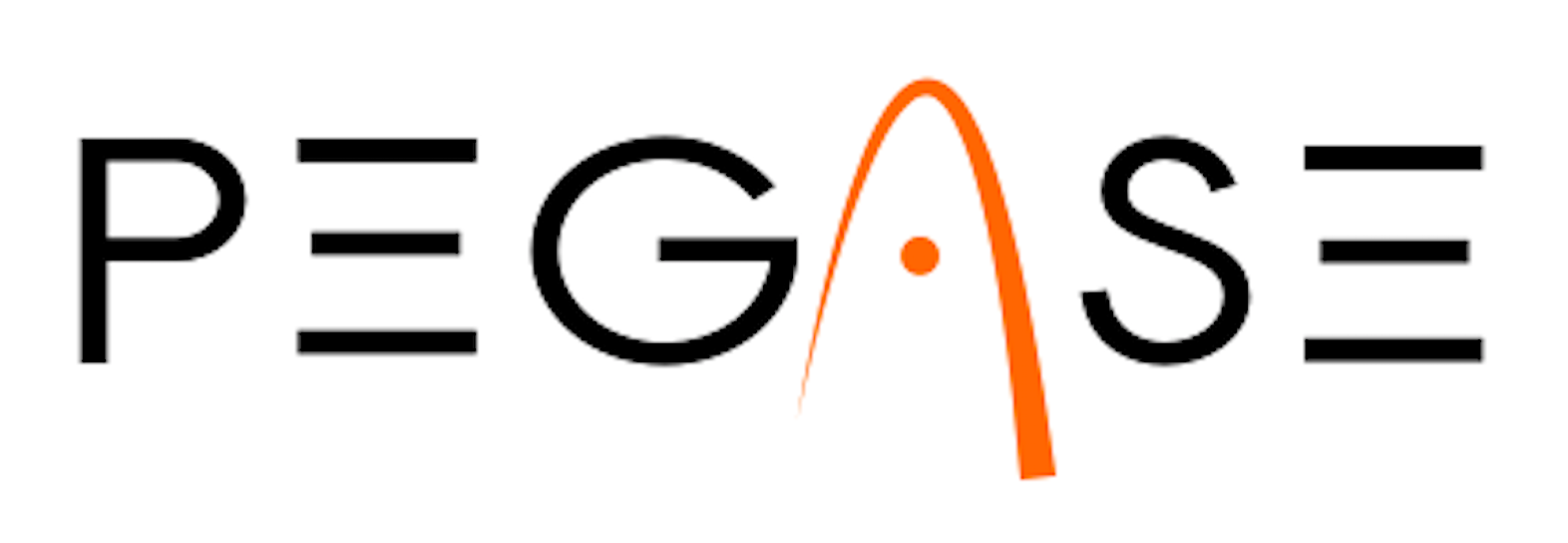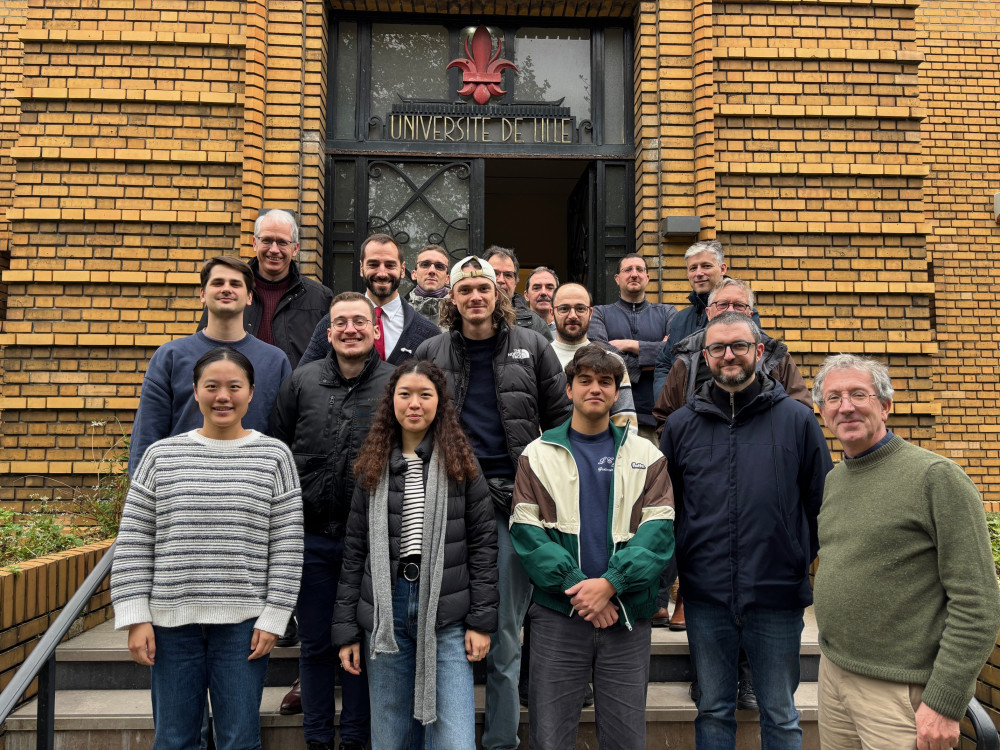 PEGASE
PEGASE
Planetology
Environments from
Ground-based
Astrometry and
Space
Exploration
Presentation
The PEGASE team is composed of astronomers, professors, PhD students and postdoctorates working on the problematics related to the dynamics of the solar system objects, from the terrestrial environment to the Trans-Neptunian objects. Pégase brings together astronomical observers, celestial mechanics theorists and specialists in numerical modeling, experts in the dynamics of natural satellites, artificial satellites, space debris, asteroids, TNOs, NEOs, meteors and planet formation.
Research activities
Our scientific problematics
- Dynamics and planetology
- Tidal effects (V. Lainey)
- Asteroids and Yarkovsky effect (J. Desmars, D. Hestroffer)
- Co-evolution of moons and planet spin axes (M. Saillenfest)
- Planet and satellite formation (K. Baillié & V. Lainey)
- Planetary rings and small satellites (S. Renner, K. Baillié, & B. Sicardy)
- Natural satellites observations (V. Robert, J. Desmars, K. Baillié & J.-E. Arlot)
- Asteroids and Gaia (W. Thuillot)
- Comets and Trans-Neptunian Objects (M. Fouchard, M. Saillenfest)
- Meteoroids and meteors (J. Vaubaillon, K. Baillié & J. Desmars)
- Atmospheres (B. Sicardy)
- NAROO (New Astrometric Reduction of Old Observations) (V. Robert, J. Desmars)
- RAPAS (Réseau Amateurs Professionnels pour les Alertes Scientifiques) (W. Thuillot)
- History of astronomy (J.-E. Arlot, J.-L. Simon)
Resources
- Numerical modeling: N-Body codes, hydrodynamical codes, statistical approaches, frequency analysis, analytical developments, perturbation methods
- Ground observations: Gaia-FUN-SSO network, NAROO, Mutual Phenomenons, Meteor networks, OHP, Subaru, stellar occultations
- Airborne based observations: 2007 Aurigids, 2008 Quadrantids, 2008 ATV reentry, 2011 Draconids, 2022 Tau-Herculids
- Space observations: CASSINI, Gaia, HST, JWS, JUICE, Mars Express, PLATO, Spitzer, etc
- Objects of interest: Asteroids, natural satellites, planets and rings, comets, NEO, artificial satellites, space debris, exoplanetary systems
The team

Working groups
Science highlights
- Baillié K., Noyelles B., Lainey V., Charnoz S., Tobie G., 2019. Formation of the Cassini Division - I. Shaping the rings by Mimas inward migration. Monthly Notices of the Royal Astronomical Society, Volume 486, Issue 2, p.2933-2946
- Baillié K., Charnoz S., Pantin E., 2015. Time evolution of snow regions and planet traps in an evolving protoplanetary disk. Astronomy & Astrophysics 577, A65
- Carry, B., Thuillot, W., Spoto, F and 42 others, 2021. Potential asteroid discoveries by the ESA Gaia mission: Results from follow-up observations. Astronomy and Astrophysics, 648, A96
- Cooper N.J., Lainey V., Meunier L.-E., Murray C.D., Zhang Q.-F., Baillié K., Evans M.W., Thuillot W., Vienne A., 2018. The Caviar software package for the astrometric reduction of Cassini ISS images: description and examples. Astronomy & Astrophysics 610, A2
- Lainey, V., Rambaux, N., Tobie, G., Cooper, N., Zhang, Q., Noyelles, B., Baillié, K., 2024.A recently formed ocean inside Saturn's moon Mimas. Nature, Volume 626, Issue 7998, p.280-282
- Lainey V., Jacobson R.A., Tajeddine R., Cooper N.J., Murray C., Robert V., Tobie G., Guillot T., Mathis S., Remus F., and 8 coauthors, 2017. New constraints on Saturn’s interior from Cassini astrometric data. Icarus, 281, 286
- Morbidelli, A., Baillié, K., Batygin, K., Charnoz, S., Guillot, T., Rubie, D., Kleine, T., 2022. Contemporary formation of early Solar System planetesimals at two distinct radial locations. Nature Astronomy 6, 72.
- Morgado, Sicardy and 57 collaborators, 2023. A dense ring of the trans-Neptunian object Quaoar outside its Roche Limit. Nature, 614, 239-243.
- Ortiz, Santos-Sanz, Sicardy et al., 2017. The size, shape, density and ring of the dwarf planet Haumea from a stellar occultation. Nature, 550, 219-223.
- Pereira, Sicardy 67 collaborateurs, 2023. The two rings of (50000) Quaoar. Astron. Astrophys. 673, L4.
- Renner S., Cooper N.J., El Moutamid M., Sicardy B., Vienne A., Murray C.D., Saillenfest M., 2016. Origin of the Chaotic Motion of the Saturnian Satellite Atlas. Astronomical Journal, 151
- Robert V., Desmars J., Lainey V., Arlot J.-E. and 15 co-authors 2021. The NAROO digitization centre: Overview and Scientific program. Astronomy & Astrophysics, 652, A3
- Robert V., Pascu D., Lainey V., Arlot J.-E., De Cuyper J.-P., Dehant V., Thuillot W., 2016. New astrometric measurement and reduction of USNO photographic observations of the main Saturnian satellites: 1974-1998. Astronomy & Astrophysics, 596
- Saillenfest M., Lari G., Boué G., 2021. The large obliquity of Saturn explained by the fast migration of Titan. Nature Astronomy, 5, 345
- Saillenfest M., Lari G., 2021. Future destabilisation of Titan as a result of Saturn's tilting. Astronomy and Astrophysics, 654, A83
- Saillenfest M., Fouchard M., Ito T., Higuchi A., 2019. Chaos in the inert Oort cloud. Astronomy and Astrophysics, 629, A95
- Sicardy, Braga-Ribas, Buie, Ortiz et Roques, 2024. Stellar occultations by Trans- Neptunian Objects. Astron. Astrophys. Rev. 32, 6.
- Sicardy, El Moutamid, Renner, Sfiar et Souami, 2025. Origins of rings in the solar system. Phil. Trans. R. Soc. A, accepté.
- Soubiran C., et al. 2018. Gaia Data Release 2. The catalogue of radial velocity standard stars. Astronomy & Astrophysics 616, A7
- Gaia Collaboration, Spoto F., et al. 2018. Gaia Data Release 2: Observations of solar system objects. Astronomy & Astrophysics 616, A13
- Gaia Collaboration, Mignard F., et al. 2018. Gaia Data Release 2. The celestial reference frame (Gaia-CRF2). Astronomy & Astrophysics 616, A14
- Gaia Collaboration, Brown A. G. A., et al. 2018. Gaia Data Release 2. Summary of the contents and survey properties. Astronomy & Astrophysics 616, A1
Software and database
- CAVIAR: CAssini Visual Image Analysis Release
- DynastVO: Virtual Observatory orbital asteroid database
- NSDB: Natural Satellites DataBase
- Multisat: Natural satellites online ephemerides
- Astersat: Asteroidal satellites online ephemerides
Contact
- Email : pegase.imcce at sympa.obspm.fr
Last update Wednesday 18 December 2024